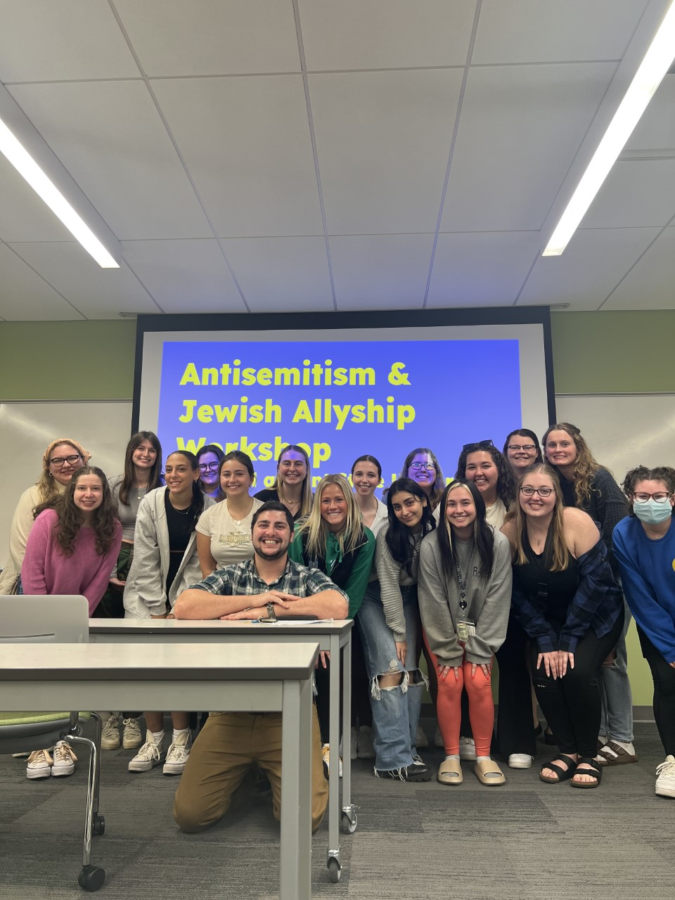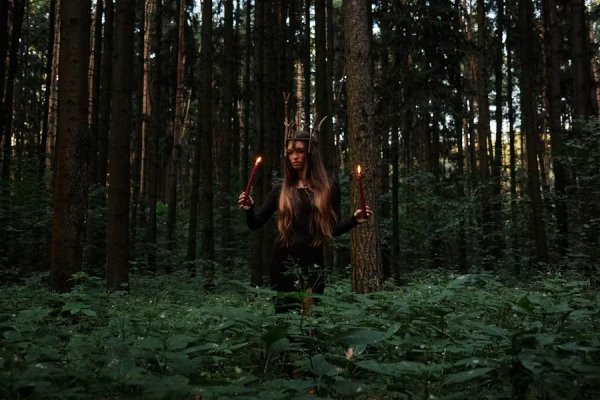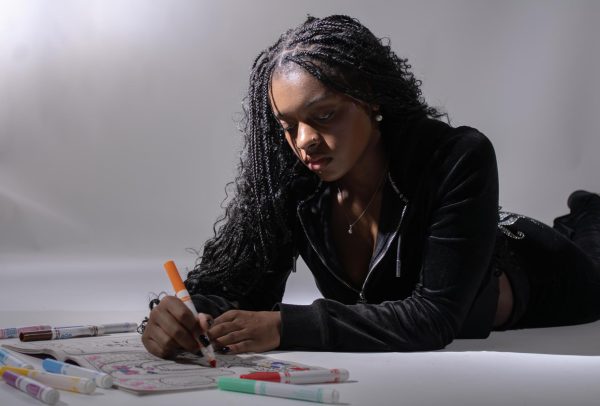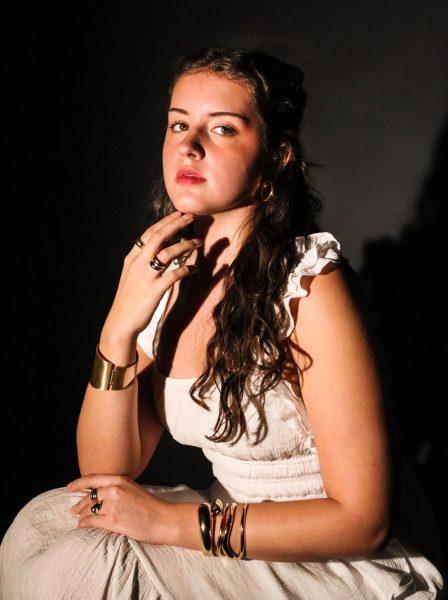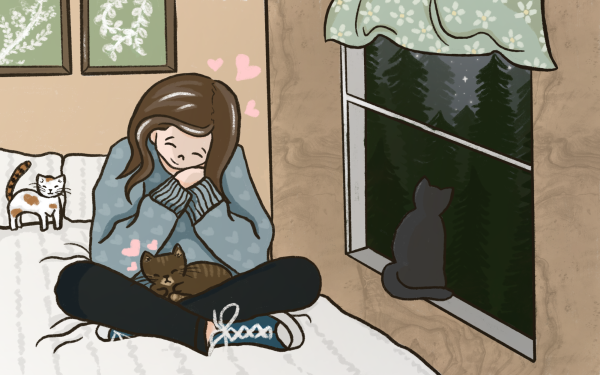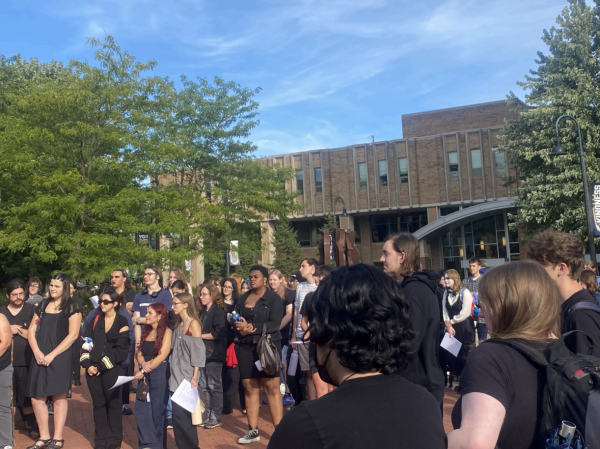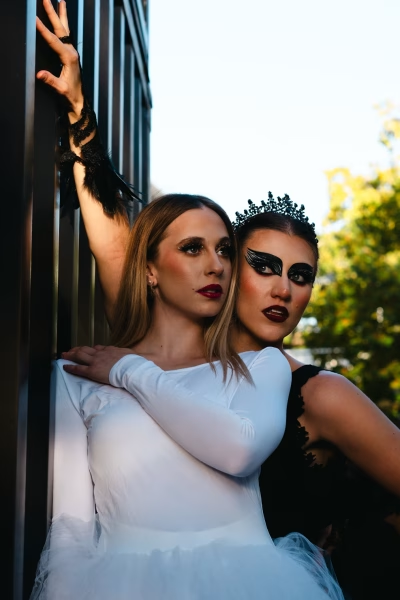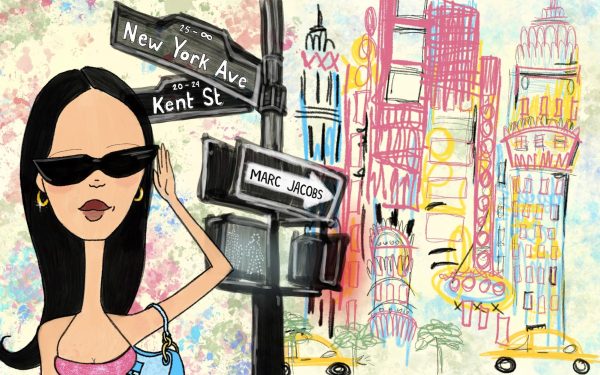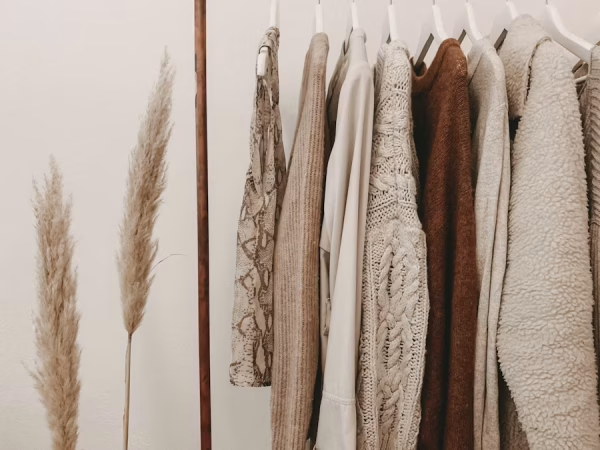how can you be an ally to the jewish community?
My name is Kayla Friedman and I am Jewish. Although I do not hide the fact that I am Jewish, I do not advertise it either. I do not advertise this part of my identity because there is always a gnawing fear in the back of my mind that someone could say something antisemitic and hateful.
Growing up in a predominantly Jewish area, I had nearly nothing to worry about. However, my fears have grown since leaving home, especially with the drastic increase in antisemitism this last year alone.
In a shocking and disturbing survey conducted by the Anti-Defamation League, in 2022 there was a 36% increase in antisemitic incidents across the United States. Not only is this statistic incredibly jarring, but last year marked the highest number of antisemitic incidents recorded since 1979 when the ADL first started tracking these incidents.
In an attempt to spread awareness about this issue, it is important to define what exactly antisemitism is so it can be understood and reported. Antisemitism is the hostility to, prejudice against or hatred of Jews, according to the United States Holocaust Memorial Museum. A person who holds such aggression is called an antisemite. Antisemitism can be seen in a variety of forms, such as physical attacks, verbal remarks, destruction of Jewish institutions or places of worship and distortion or denial of the Holocaust.
There remains a problem regarding antisemitism, and that is the ignorance surrounding it. Many people are unaware of the word “antisemitism” and what it means. Additionally, there are individuals who have not learned about the Holocaust or lack information about it. The Claims Conference conducted the first 50-state survey on Holocaust knowledge and the results were shocking. From this survey, it is clear that there is a disconnect about the events of the Holocaust — three worrisome statistics emerged:
It was reported that 1 in 10 people have never even heard of the word “Holocaust.”
63% of people were unaware that six million Jews perished during the Holocaust.
Of the people who were aware of the Holocaust, 11% believed it was the fault of the Jewish people.
These results are terrifying. Antisemitism was the driving force that caused the Holocaust, so it is important to understand the dangerous implications of hatred, discrimination and prejudice. The results of this survey are a reminder that education is imperative to boost awareness and advocacy. Educating the younger generations will hopefully have a positive impact on this problem. If we do not know there is a problem, how can support be given?
Countless instances of antisemitism have occurred in recent years and it is important to note them to spread awareness. In 2018, a gunman opened fire at the Tree of Life Synagogue wounding six people and killing 11. This was marked as the deadliest act of antisemitism in American history. A peaceful Saturday morning dedicated to prayer was uprooted by the rampage and hate of this man.
Antisemitism happens right in our backyard and is not something we can hide from. Just last May, a swastika was found drawn on a stairway outside of Engleman Hall and the Verder Hall C-lot. A swastika is a symbol that Adolf Hitler adopted to represent the Nazi Party. Today, it is a painful reminder of the tragic events of the Holocaust and the Nazi Party. The police were called and there was an attempt to wash it away, but an outline still remains. The outline that lingers is a reminder of the hatred that Jews across the country are subject to time and time again.
In that same ADL report, it was found that there was a “41 percent increase of antisemitic activity reported on college and university campuses.” What does that mean for us as a Kent State community? We need to remain observant so that incidents can be appropriately handled and reported, and it means that the Jewish community needs extra support.
The Jewish community needs allies on their side, and this article serves as a resource to make that happen.
What Is Judaism?
Michael Pollak, the Director Of Student Life of Hillel at Kent State, said, “Some people might meet their first Jewish person ever in college.” Hillel provides a Jewish community at 850 college campuses and is a place where students can go to feel connected to Jewish culture through events, holiday celebrations and more.
I have been told by different people that I was the first or one of the first Jewish people they had ever met, and that shocked me coming from a town with a large Jewish community. It is important to note, according to the Pew Research Center, that there are 14.8 million Jewish people in the world, only making up 0.2% of the total population.
An important part of becoming a Jewish ally is understanding Jewish culture, history and traditions. Read up on different Jewish holidays, practices and history in order to be knowledgeable in this area. Pollak says, “We do not expect that non-Jews study everything there is to know about Judaism and we just ask that you support us…” You do not need to be an expert when it comes to knowing Jewish culture, but a basic understanding would mean all the difference. Below is a helpful summary of Jewish culture and holidays, which will hopefully give you a headstart to becoming a Jewish ally.
Jewish individuals do not just fit into one checkbox, and the way media and television portray Jewish people is not all-encompassing, Abigail Zied, co-president of the student board at Hillel said.
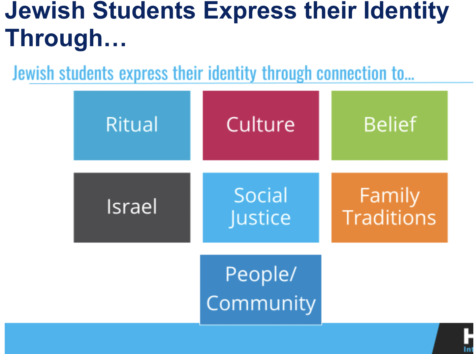
No two Jews are the same and they may celebrate holidays or worship differently. Some Jews keep Kosher and will not eat meat and dairy together, and some do not. Some Jews celebrate Shabbat every Friday night by lighting candles as a reminder that it is a day of rest, and some do not. Some Jews wear a Yarmulke/Kippah as a symbol of respect for God, and some do not. Some women wear a sheitel, which means “wig,” to not show their hair in public to signify that they are married and to remain modest, and some do not. Depending on different denominations of Judaism, individuals practice different customs, eat different foods and celebrate holidays in varying ways. However, most Jews celebrate the same following holidays:
Rosh Hashanah: The Jewish New Year and a time of reflection. Jews attend synagogue (place of worship/temple) to pray, and the Shofar (ram’s horn) is blown in three blasts, and some Jews attend tashlich (bread is thrown into a body of water to “cast away” sins).
Yom Kippur: The holiest day meant for atonement. It is customary to seek forgiveness from those you have hurt or forgive those who have wronged you. It is a time for self-reflection and acknowledgment that perfection does not exist. Jews attend synagogues, as well. Some Jews fast for one day as a way to cleanse the body and celebrate with “break fast.”
Chanukah/Hanukkah: A holiday lasting for eight days to celebrate the victory of the Maccabees over the much larger Syrian army. It is said that the oil was supposed to last for one night in the temple, but miraculously lasted for eight whole nights. Jews light the menorah (candelabra with nine branches) and say special prayers each night. Typically, Latkes (potato pancakes), Sufganiyot (jelly donuts) and gelt (chocolate gold coins) are eaten and gifts are exchanged each night.
Passover: The most widely celebrated Jewish holiday, this holiday marks the Israelites’ escape from slavery in Egypt. It is celebrated with a special seder, in which Jews gather to recite prayers, retell the story of Passover and eat special foods that represent the story of Passover. Some Jews do not eat anything leavened during this time, meaning nothing risen with yeast, and instead, they eat matzah (a cracker-like bread).
How Can You Support the Jewish Community?
Education is the most important way to help this situation, as knowing about the issues Jewish individuals encounter is the first step to awareness and eventually advocacy. Stay informed about current events in the Jewish community and be sure to reach out in times of crisis. Supporting your Jewish friends and peers is instrumental as it helps us to know there are people who care and are willing to help in times of need.
Pollak says the best ways to support Jewish individuals are to “sign up for an antisemitism workshop, enrich yourself in Jewish culture and befriend some Jewish people.”
Zied advises, “When you see something, say something, even if you’re not Jewish.” This piece of advice is golden, as it is imperative that as a community at Kent State, we stay vigilant of our surroundings, especially in times of crisis. It is even more important to report instances of antisemitism, in order to protect the Jewish community. If you see something do not be afraid to report it to the authorities or in one of three ways:
- Contact Hillel directly at kenthillel.org/report-antisemitism
- Inform Hillel in person or via email to Pollak at [email protected]. Additionally, you can call or text Hillel at 330-678-0397.
- Go to https://www.reportcampushate.org/
Zied explained how when she was in high school her color guard team discovered a swastika painted on the back wall of the stage when they were practicing. It had never been noticed before because they did not frequently practice on the stage. Her teammates expressed how bad they thought it was, but went right back to practicing. She was the only one enraged enough to report it to the principal. This goes to show how important it is to speak up if you see something, even if you are not Jewish.
The Blue Square Campaign
Robert Kraft, the owner of the New England Patriots, has launched a new campaign through the Foundation to Combat Antisemitism, called #StandUptoJewishHate. A simple blue square is being used to promote awareness of the hate going on in this country. Through this campaign, “…the blue square will take up 2.4% of television and digital screens, billboards, and social media feeds. That number symbolizes that Jews make up 2.4% of the American population, yet are the victims of 55% of religious-based hate crimes,” CBS News reported.
Even in this singular Twitter post, the comments are flooded with Antisemitic remarks. Pollak mentioned, “The only time you see activism on social media [for the Jewish community] is when a Jewish person posts it.” Hopefully, this campaign can be a way for individuals of all backgrounds to support the Jewish community and I urge you all to support this cause.
Jewish Allyship and Antisemitism Training: How to be a Jewish Ally
I had the privilege of attending the Jewish Allyship and Antisemitism training and even as a Jew, it was such an educational and eye-opening experience. Led by Michael Pollak and Jocelyn Feldman, the Student Life Coordinator at Hillel, they talked about what it means to be Jewish, the meaning of Antisemitism, important statistics and how to be an ally to the Jewish Community.
Hillel at Kent State created this training with the help of Hillel International in order to, “…take a front approach and stop it [antisemitism] in its tracks,” Pollak added.
We started off the workshop with a couple of icebreakers, but the one that stood out the most was when we went around the room and introduced ourselves based on one identifier. As people started to introduce themselves, they said the following: “I am a woman, I am Catholic, I am a student, I am a service dog handler.”
When it became my turn to speak I said: “I am Jewish.” For the first time, I had put this part of my identity on full display and in a room full of people that I did not know. Identical to the opening sentence of this article, but this time I said it without hesitation. It was empowering.
First, we watched a few videos outlining Jewish culture and antisemitism in the media. We discussed different instances of antisemitism that have happened in recent years, including ones on or near Kent State’s Campus.
In addition, Pollak and Feldman outlined what is considered to be antisemitic and what is not antisemitic involving Israel. They mentioned that it is not antisemitic to oppose Israel’s government, but it is antisemitic to single out and discriminate against Israelis as a group.
Lastly, they passed out a Jewish Allyship Pledge that everyone in the room signed promising to support the Jewish community.
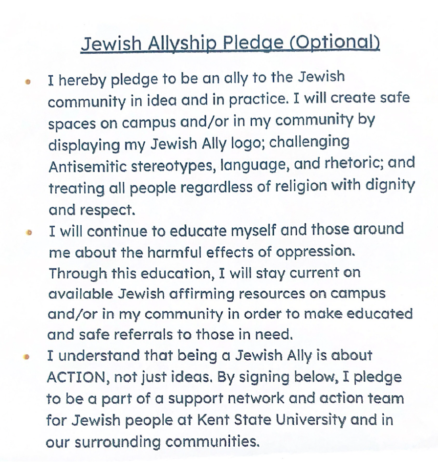
Then a description of how to be an ally was discussed. In the pamphlet given out, these eight tips were mentioned:
- Think before speaking
- Don’t be silent when you witness antisemitism
- Condemn and call out Antisemites
- Refrain from saying Jewish jokes
- Include the Jewish community in your advocacy
- Reach out to the Jewish Community when an incident occurs
- Recognize and educate yourself on Jewish history/holidays and practices
- Antisemitism grows through silence, indifference, and inaction; so speak out, take action, and care.
If I can ask anything of anyone reading this article it is to be there for your Jewish friends and or peers, especially in these trying times. I do not ask you to learn everything about Judaism, but it is important to be aware of antisemitic events and the discrimination going on in this country. I ask you to share this article to promote awareness of the crisis going on in this country and include the Jewish community in your advocacy agenda. If you do not know anyone Jewish on campus, you now know me.
Learn, support and advocate – that is all it takes. Although we cannot stop antisemitism, we can certainly lessen its effects and it all starts with awareness.
Support Student Media
Hi! I’m Catie Pusateri, A Magazine’s editor-in-chief. My staff and I are committed to bringing you the most important and entertaining news from the realms of fashion, beauty and culture. We are full-time students and hard-working journalists. While we get support from the student media fee and earned revenue such as advertising, both of those continue to decline. Your generous gift of any amount will help enhance our student experience as we grow into working professionals. Please go here to donate to A Magazine.

